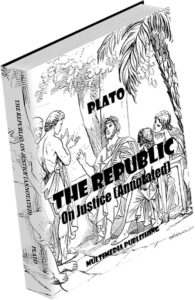 Πολιτεία, published on 375 BC, by Plato (428/427 or 424/423 BC – 348/347 BC)
Πολιτεία, published on 375 BC, by Plato (428/427 or 424/423 BC – 348/347 BC)
Translation by Benjamin Jowett (1817 – 1893), Published by The Colonial Press in 1901
Special Introduction by William Cranston Lawton (1853 – 1941)
Introduction by Nicolae Sfetcu
Cover: Plato in his academy (cropped), 1879 – Unknown xylographer, After Carl Wahlbom (1810–1858)
The Republic of Plato is considered an integral part of the utopian literary genre. The book is divided into 10 books: the first deals with the subject of justice; in the next two books Plato expounds his theory of the “ideal state”; the fourth and fifth books deal with the relationship between things and ideas, between the sensitive and supersensitive world (hyperuranion); books six and seven describe the theory of knowledge; the eighth and ninth books talk about the state and the family; and the last book examines the idea of the immortality of the soul with the Myth of Er.
The central theme of the book is justice, argued with the help of several Platonic theories, including the allegorical myth of the cave, the doctrine of ideas, dialectics, the theory of the soul and the project of an ideal city. A book of moral philosophy, in which the real questions are how to live best, and what is the best order or organization of human society.
The Republic is considered by many academics to be the greatest philosophical text ever written, being the most studied book in top universities.
CONTENTS:
Introduction
– Plato
– – Biography
– – Travels
– – Socrates
– – Academy
– – Plato’s work
– – – Classifications of works
– – – – Chronological
– – – – Tetralogy
– – – – Trilogies
– – – – Lexical grouping
– Plato’s philosophy
– – Soul
– – The function of the myth
– – Ideas – Theory of Forms
– – Ontology
– – Epistemology
– – Ethics
– – Politics
– – The philosophical state
– – Art
– – Unwritten doctrines: One and the Dyad
– The Republic
– – Characters
– – Summary
– – Topics
– – – Justice and righteousness (Book I)
– – – The Ideal State (Books II-III)
– – – The city-soul analogy. Harmony of the parties (Books IV-V)
– – – Form Theory (Metaphor of the Line and the Myth of the Cave, Books VI-VII)
– – – Family and State (Books VIII-IX)
– – – Myth of Er (Book X)
– Dialectics
– Education
– Philosopher-king
– Bibliography
Special introduction
Book I. Of wealth, justice, moderation, and their opposites
Book II. The individual, the state, and education
Book III. The arts in education
Book IV. Wealth, poverty, and virtue
Book V. On matrimony and philosophy
Book VI. The philosophy of government
Book VII. On shadows and realities in education
Book VIII. Four forms of government
Book IX. On wrong or right government, and the pleasures of each
Book X. The recompense of life
MultiMedia Publishing https://www.telework.ro/en/e-books/the-republic-on-justice-annotated-by-plato/ https://www.cartilibrarie.com/carte/the-republic-on-justice-annotated/
– Digital: EPUB (ISBN 978-606-033-652-5), Kindle (ISBN 978-606-033-653-2), PDF (ISBN 978-606-033-654-9)
Tipărit: Format B5 176 x 250 x xxx mm, xxx g, xxx pagini. ISBN 978-606-033-878-9
DOI: 10.58679/MM91136
Publishing date: 17.02.2022
PREVIEW:
Google (EPUB, PDF):
eMAG:












Reviews
There are no reviews yet.